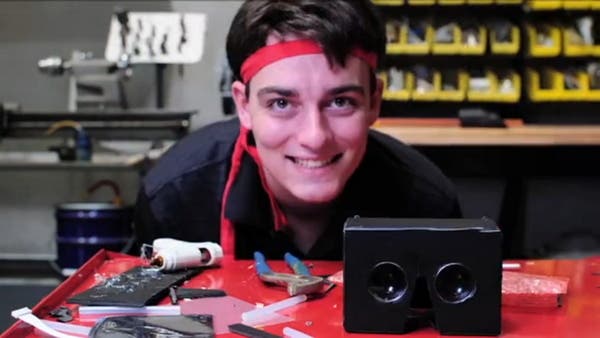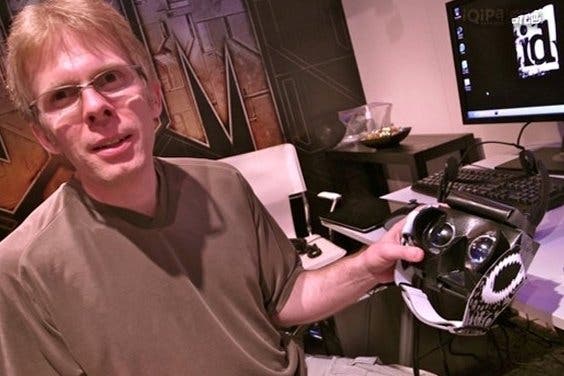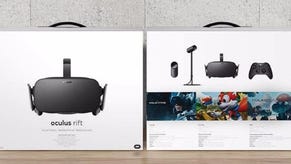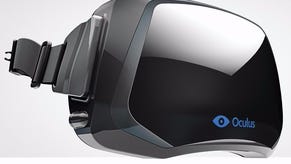Oculus accuses ZeniMax of trying to cash in on $2bn Facebook deal
Lawsuit heats up.
Oculus VR has filed its defence for the upcoming lawsuit with ZeniMax over the Rift virtual reality headset.
In May id parent company ZeniMax accused former id co-founder John Carmack of stealing VR tech before he left the company to work for Oculus VR full-time. The two parties couldn't settle the dispute amicably and ZeniMax filed a lawsuit against Oculus VR and its founder, Palmer Luckey.
Now, Oculus has hit back, accusing ZeniMax of trying to cash in on Facebook's $2 billion purchase of the company earlier this year.
"ZeniMax's Complaint falsely claims ownership in Oculus VR technology in a transparent attempt to take advantage of the Oculus VR sale to Facebook," defense documents given to Eurogamer by Oculus read.
"By deliberately misstating some facts and omitting others, ZeniMax makes the incredible assertion that it, a video game software publishing company for personal computers and consoles like the Sony PlayStation, invented and developed a virtual reality hardware and software system.

"The truth is quite different. There is not a line of ZeniMax code or any of its technology in any Oculus VR product. Indeed, ZeniMax had never identified any 'stolen' code or technology in any Oculus VR product, although ZeniMax had the full source code for the Oculus VR software for over a year and a half (having received it directly from Oculus VR well before it was even released publicly), and could have analyzed it online anytime (at developer.oculusvr.com)."
ZeniMax accuses Luckey and company of "illegally misappropriating ZeniMax trade secrets relating to virtual reality technology, and infringing ZeniMax copyrights and trademarks".
The suit also accuses Oculus of "breach of contract, unjust enrichment, and unfair competition against the defendants". It noted that Oculus broke some non-disclosure agreements related to intellectual property that "provided the fundamental technology driving the Oculus Rift since its inception".
"Luckey has held himself out to the public as the visionary developer of virtual reality technology, when in fact the key technology Luckey used to establish Oculus was developed by ZeniMax," the company claimed in a recent announcement about the impending lawsuit.
Oculus countered this by accusing ZeniMax of being opportunistic: "Until the Facebook deal, and the perceived chance for a quick payout, ZeniMax never raised any claim of infringement against Oculus VR, undoubtedly because ZeniMax never has contributed any intellectual property or technology to Oculus VR," it said.
"The Oculus Rift was conceived by a gifted teenage inventor, Palmer Luckey. Luckey pioneered major advancements in virtual reality technology. He then decided to turn those advancements into something other people could use in the form of the Rift - the world's leading, head-mounted, virtual reality headset. Luckey created many working virtual reality (VR) head-mounted displays (HMDs), incorporated a number of different motion sensors into those HMDs, shared his work publicly, and displayed those HMDs live on numerous occasions - all before having any interaction or communication with ZeniMax."

Interestingly, the document reveals that before Luckey was about to launch the Oculus Rift Kickstarter campaign, ZeniMax suggested he delay the campaign because ZeniMax was interested in funding Oculus VR's work.
But Oculus VR declined to delay the Kickstarter campaign, and it went on to smash its goal.
"While ZeniMax professed interest in funding future Oculus VR work, it did not raise any claim of infringement against Oculus VR," the document reads.
It also reveals that in December 2012 Oculus sent ZeniMax a preview of its source code for developer tools and other software, but ZeniMax failed to make a claim on the code or say the technology was based on Carmack's work.
"Indeed, despite having the code to review for a year and a half, ZeniMax made no claim to it until after Facebook announced its acquisition of Oculus VR," Oculus said.
Meanwhile, Oculus says it offered ZeniMax multiple opportunities to invest in the company.
"Ultimately, instead of investing in the company, ZeniMax demanded an outsized and non-dilutable stake in Oculus VR in supposed exchange for the publicity Carmack's demonstrations and endorsement had generated.
"When Oculus VR declined, ZeniMax requested no compensation for any technological contributions, nor did it pursue its own virtual reality technology. Instead, it told Carmack to shut down all of his virtual reality research, and told others inside ZeniMax not to work on VR video game support. Carmack followed ZeniMax's instruction and, later, with ZeniMax's permission, published much of his virtual reality work to the world in an online white paper."









